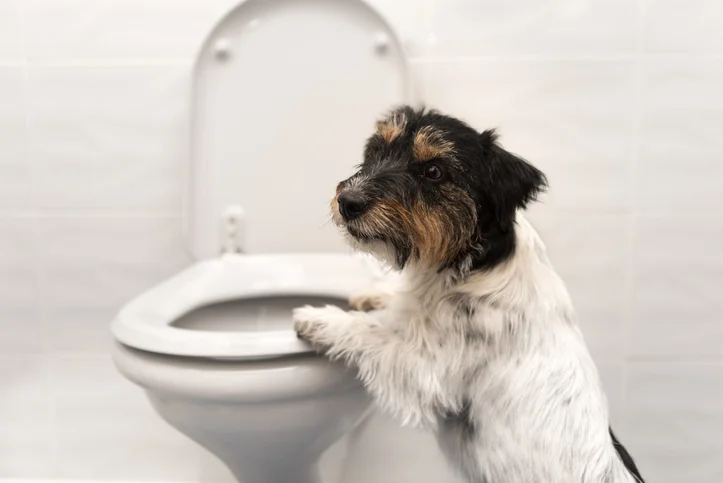
As a pet and property owner, cleaning up after your furry friends is important to ensure your property is clean and disinfected. However, when disposing of animal waste, many opt to flush it down the toilet. After all, it seems like the most convenient option, right? Unfortunately, this common practice can actually have harmful effects on your plumbing system and the environment.
Our team at Mr. Rooter Plumbing of South Jersey wants to explore why pet owners should refrain from flushing animal waste down the toilet, addressing common misconceptions, and providing alternative disposal methods.
What Comprises Animal Waste?
Animal waste refers to bodily excretions such as feces and urine from pets such as cats, dogs, and rabbits. These excretions contain bacteria, pathogens, viruses, and parasites that can harm humans and the environment. Some types of animal waste, such as feces from dogs and cats fed on processed foods, may contain harmful bacteria like E.coli, salmonella, and campylobacter. Flushing this type of waste down the toilet could pollute waterways and destroy the ecosystem.
Environmental and Physical Dangers of Flushing Pet Waste
In the environment, flushing waste can contaminate waterways, killing aquatic life and harming the ecosystem. The waste that might be considered flushing down the toilet could also adversely impact your plumbing and sewage systems in the following ways.
End Up in Sewage Treatment Plants
Flushing pet waste down the toilet can have a detrimental impact on sewage treatment plants and the overall water quality. Pet waste contains harmful bacteria and pathogens that, if not properly treated, can contaminate water sources and pose a risk to aquatic life and human health. Sewage treatment plants are designed to handle human waste and other biodegradable materials, but they are not equipped to effectively treat the bacteria and pathogens present in pet waste.
Clog Pipes
While some pet owners believe that since they can flush their own feces down the toilet, an animal's feces shouldn't be any different, the reality is quite different. Pet waste can potentially clog pipes when flushed down the toilet.
Here are a few reasons why:
- Density: Animal waste is often dense and easily gets stuck in pipes. Unlike human waste, which is designed to be flushed away smoothly, pet waste contains elements like grass, dirt, raw hide, hair, and other materials that can create blockages in the plumbing system.
- Potential damage: Flushing pet waste, even in small amounts over time, can lead to costly repairs. It can cause cracked pipes and other plumbing issues, resulting in the need for professional intervention.
- Public and private waste management systems: Flushed pet waste can also cause problems in public and private waste management systems. It can overload septic tanks and other sewage treatment systems, leading to backups.
Leading to Untreated Sewage Overflows
Flushing excessive amounts of pet waste can overwhelm the sewer system's capacity to handle the additional waste load. This can cause backups and overflows, leading to untreated sewage entering waterways.
Additionally, pet waste, particularly when combined with other non-biodegradable items like wipes or litter, can create sewer pipe blockages. These blockages prevent the proper flow of wastewater and can cause sewage to back up and overflow.
Flushing Pet Waste Could Affect Human Health
In addition to environmental hazards, flushing pet waste down the toilet could be detrimental to human health. The bacteria found in animal excrement exposed to sewage might cause infectious diseases. For that reason, people whose immune systems have been weakened by particular diseases, medical treatments, or age can be in danger of disease from even the smallest bacterial exposure in contaminated water.
Alternative Ways to Responsibly Disposing of Pet Waste
The most secure and sustainable way of disposing of pet waste is by composting it. Cat litter can be useful fertilizer for your garden if you compost it safely and appropriately. However, it is essential to do this correctly to prevent exposure to the dangerous parasites that the waste might have. It is best to research before composting your pet waste, as certain toxins can persist even after the composting process is finished.
Another safe way to dispose of pet waste is by bagging and throwing it in the trash bin. Here, it is crucial to choose the appropriate bag for disposal, such as biodegradable bags that quickly decompose, reducing the carbon footprint of landfills.
Clogged Drains Due to Pet Waste? Mr. Rooter Plumbing of South Jersey Can Help!
Flushing pet waste can lead to clogged pipes and sewer backups, seriously threatening your plumbing system. Mr. Rooter Plumbing of South Jersey offers comprehensive plumbing services that can address these issues effectively, from drain cleaning to sewer line repairs. Our knowledgeable technicians will assess the situation, provide expert advice, and implement solutions that restore the proper functioning of your plumbing system.
With our reliable and prompt service, you can trust us to handle your plumbing needs caused by flushing pet waste, ensuring a hassle-free and efficient resolution to the problem.
Contact us to learn more about our plumbing solutions and how we can support you.

